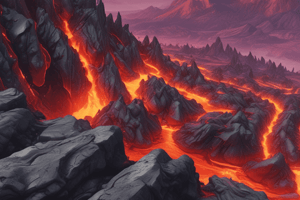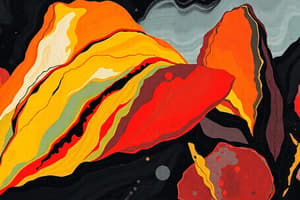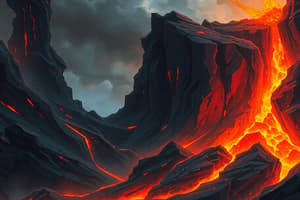Podcast
Questions and Answers
Plutons can be studied on Earth's surface as they form.
Plutons can be studied on Earth's surface as they form.
False (B)
What do Sills, Laccoliths, Dikes, and Batholiths have in common?
What do Sills, Laccoliths, Dikes, and Batholiths have in common?
They form between Earth's surface and can only be studied after uplift and erosion have exposed them.
What three characteristics are used to classify intrusive igneous bodies?
What three characteristics are used to classify intrusive igneous bodies?
Shape, size, and relationship to the surrounding rock layers.
What forms when magma from a large magma chamber invades fractures in surrounding rocks?
What forms when magma from a large magma chamber invades fractures in surrounding rocks?
What forms when a large intrusive igneous body of greater than 100 km² accumulates and becomes exposed?
What forms when a large intrusive igneous body of greater than 100 km² accumulates and becomes exposed?
What forms when magma is injected between sedimentary layers close to Earth's surface and collects as a lens-shaped mass?
What forms when magma is injected between sedimentary layers close to Earth's surface and collects as a lens-shaped mass?
What forms when magma is injected along sedimentary bedding surfaces close to Earth's surface?
What forms when magma is injected along sedimentary bedding surfaces close to Earth's surface?
Magma forms when solid rock in the crust and upper mantle partially melts.
Magma forms when solid rock in the crust and upper mantle partially melts.
What is one way that magma is generated?
What is one way that magma is generated?
The rate at which temperature changes with depth below Earth's surface is called the what?
The rate at which temperature changes with depth below Earth's surface is called the what?
How is decompression melting of rocks triggered?
How is decompression melting of rocks triggered?
______ rock buried at depth has a much lower melting temperature than does ______ rock of the same composition and under the same pressure.
______ rock buried at depth has a much lower melting temperature than does ______ rock of the same composition and under the same pressure.
What provides the mechanism by which mantle rocks melt and magma is produced?
What provides the mechanism by which mantle rocks melt and magma is produced?
What change allows rock melting to begin at convergent plate boundaries?
What change allows rock melting to begin at convergent plate boundaries?
What landforms develop as a result of volcanic activity that occurs where one oceanic plate descends beneath another oceanic plate?
What landforms develop as a result of volcanic activity that occurs where one oceanic plate descends beneath another oceanic plate?
Rising magma, at ocean-continental plate boundaries, changes composition before reaching the surface.
Rising magma, at ocean-continental plate boundaries, changes composition before reaching the surface.
At a convergent plate boundary, at what depth do fluids reduce the melting point of hot mantle rock enough to begin melting?
At a convergent plate boundary, at what depth do fluids reduce the melting point of hot mantle rock enough to begin melting?
Most magma is produced along ______ plate boundaries.
Most magma is produced along ______ plate boundaries.
When solid mantle rock rises during seafloor spreading, magma is produced as a result of decompression melting.
When solid mantle rock rises during seafloor spreading, magma is produced as a result of decompression melting.
Why does the newly formed magma at divergent plate boundaries rise to the surface?
Why does the newly formed magma at divergent plate boundaries rise to the surface?
Intraplate volcanism occurs where?
Intraplate volcanism occurs where?
Where does intraplate volcanism occur?
Where does intraplate volcanism occur?
What is the result of a magma plume rising and decompression melting occurring?
What is the result of a magma plume rising and decompression melting occurring?
How many years do most hot spots last?
How many years do most hot spots last?
What three factors determine how violently or quietly a volcano erupts?
What three factors determine how violently or quietly a volcano erupts?
What describes lava's resistance to flow?
What describes lava's resistance to flow?
One thing all volcanic eruptions have in common is that they emit large amounts of gas.
One thing all volcanic eruptions have in common is that they emit large amounts of gas.
What type of volcano generates the most explosive eruptions?
What type of volcano generates the most explosive eruptions?
What is the conduit that feeds magma to a volcano's surface called?
What is the conduit that feeds magma to a volcano's surface called?
What forms when low viscosity basaltic lava flows from fissures over a wide area?
What forms when low viscosity basaltic lava flows from fissures over a wide area?
What is the rock conduit that remains after the surrounding cone has been eroded?
What is the rock conduit that remains after the surrounding cone has been eroded?
Flashcards are hidden until you start studying
Study Notes
Intrusive Igneous Bodies
- Plutons can only be studied on the surface after uplift and erosion expose them.
- Sills, laccoliths, dikes, and batholiths form between Earth's surface; visibility occurs post-uplift and erosion.
- Classification of intrusive igneous bodies is based on shape, size, and relationship to surrounding rock layers.
Types of Intrusive Features
- Dikes form when magma invades fractures in surrounding rocks.
- Batholiths are large intrusive igneous bodies greater than 100 km² that become exposed over time.
- Laccoliths are formed when magma is injected between sedimentary layers, creating a lens-shaped mass.
- Sills occur when magma is injected along sedimentary bedding surfaces.
Magma Formation and Melting
- Magma forms when solid rock in the crust and upper mantle partially melts.
- One method of generating magma involves raising the temperature of rocks above their melting points.
- Decompression melting occurs when confining pressure decreases, allowing hot rock to melt as it moves to the surface.
- Wet rock has a lower melting temperature compared to dry rock of the same composition.
Plate Boundary Dynamics
- Plate motions are the mechanism for mantle rock melting and magma production.
- At convergent boundaries, the presence of water reduces the melting point of mantle rock.
- Chains of volcanoes form on the ocean floor due to volcanic activity as one oceanic plate descends beneath another.
- At ocean-continental plate boundaries, rising magma changes composition before surfacing.
Characteristics of Magma and Eruptions
- Most magma production occurs along divergent plate boundaries.
- Newly formed magma rises due to being less dense than the surrounding mantle rock.
- Intraplate volcanism occurs within a tectonic plate, involving hotter-than-normal mantle material rising to the surface.
- Notable sites of intraplate volcanism include Yellowstone National Park and Kilauea Volcano.
Volcanic Activity and Hazards
- The formation of hot spots can occur from magma plumes and decompression melting.
- Hot spots can last millions of years, contributing to persistent volcanic activity.
- Eruption dynamics are influenced by magma composition, temperature, and gas content.
- Lava's resistance to flow is termed viscosity, affecting eruption style.
Eruption Types and Features
- Composite volcanoes are considered the most dangerous due to their explosive eruptions.
- A pipe is the conduit through which magma is fed to the surface of a volcano.
- Lava plateaus arise from low-viscosity basaltic lava flows over wide areas.
- Volcanic necks remain as rock conduits after the surrounding cone has eroded away.
Studying That Suits You
Use AI to generate personalized quizzes and flashcards to suit your learning preferences.




